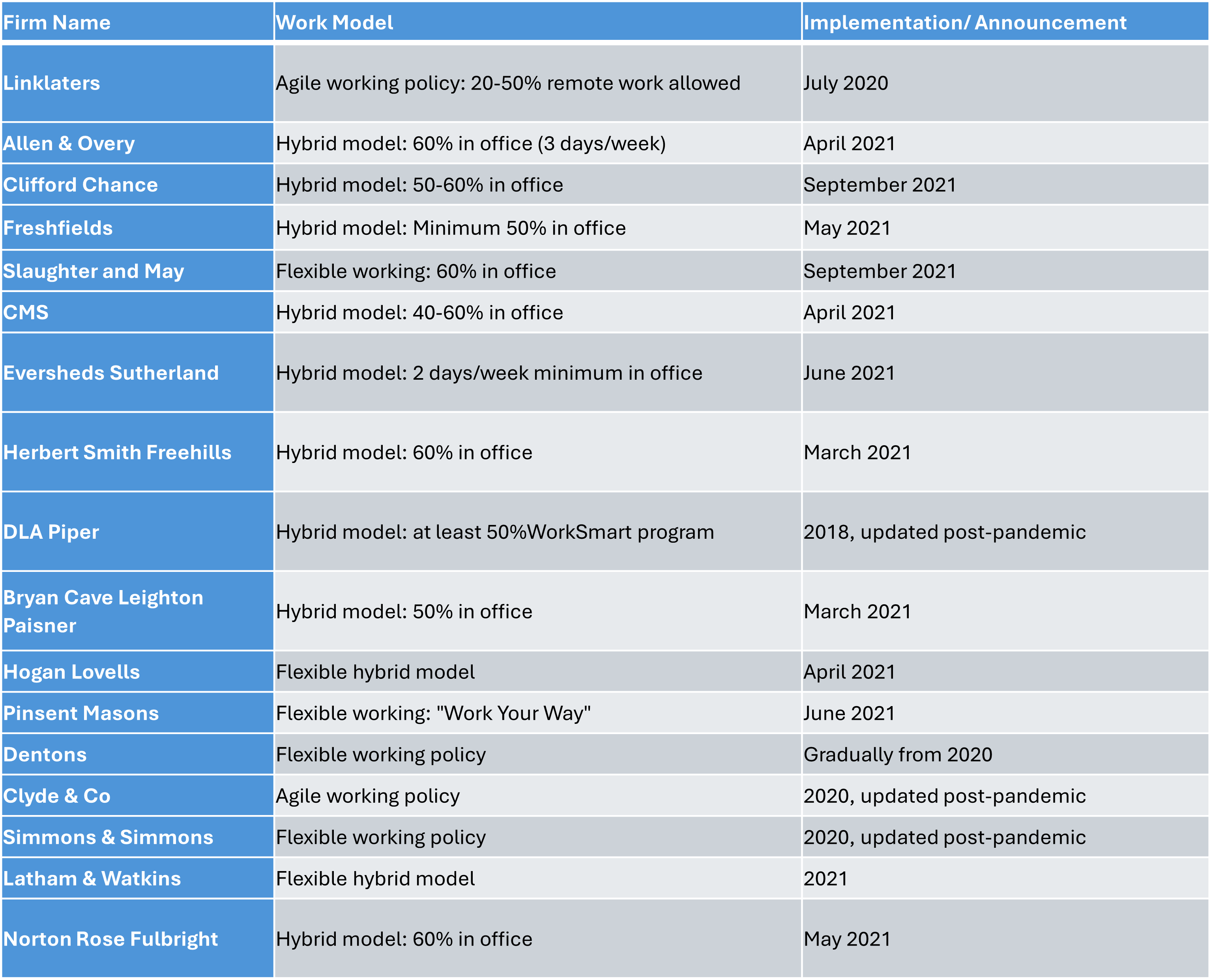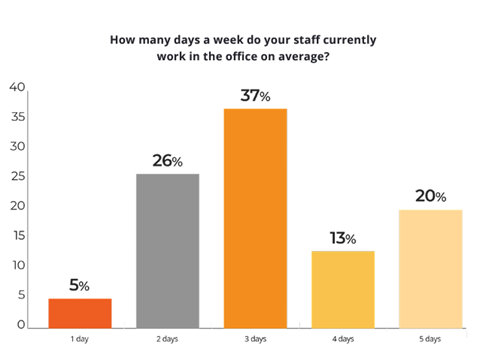Embracing the Hybrid Model: How UK Legal Firms are Adapting Their Workplaces
The UK legal industry is rapidly transforming its work models, especially with the increased adoption of hybrid work. This shift has driven firms to reconsider traditional office spaces and reimagine their IT infrastructure. While the hybrid model offers flexibility, it also presents complex demands on IT systems, data security, and workspace design to meet modern needs. Here, we explore these changes and what UK legal firms are doing to “earn the commute” of their hybrid teams.
The Shift to Hybrid Work in UK Law Firms
Hybrid work is increasingly becoming the norm across the UK, and the legal sector is no exception. Many of the UK’s top law firms have implemented flexible models that typically require employees to be in the office for a few days per week, balancing in-person collaboration with the convenience of remote work. This model offers several benefits to both firms and employees. Lawyers gain flexibility in managing their time, reducing commuting hours, and balancing work with personal responsibilities. For law firms, hybrid work is a strong draw for top talent, aligning with employee preferences for flexibility.
However, the transition to hybrid work hasn’t been entirely seamless. Approximately 27% of legal professionals now view hybrid work as a day-to-day challenge, citing issues such as technology gaps and limited streamlined remote access. Some firms struggle to align their hybrid policies with employee expectations, while others face pressures to maintain productivity and client satisfaction.
New Challenges for IT Infrastructure and Security
As legal firms adapt to hybrid models, their IT infrastructure must keep pace. Ensuring reliable access to case files, secure client communication, and real-time collaboration are top priorities. Traditionally, many firms relied on legacy systems capable of handling in-office tasks but less effective for remote access. Today, law firms are transitioning to cloud-based solutions and integrated management platforms to provide secure, real-time access to essential resources from any location.
Data security remains paramount as firms manage sensitive client information and communications across dispersed locations. With cyber threats on the rise in the legal sector, robust IT security is crucial. Approximately 37% of legal firms cite cybersecurity as a primary benefit of their digital systems. Cloud solutions are increasingly preferred for their regular updates, scalability, and high data protection standards, making them more resilient than traditional on-premises servers.
A significant aspect of evolving IT infrastructure includes collaboration tools. Legal tech solutions now offer seamless document sharing, version tracking, and digital collaboration, enabling distributed teams to work together efficiently. AI and machine learning applications also support firms in automating tasks such as document review and client onboarding, helping firms stay competitive by reducing turnaround times and minimizing manual errors.

Status of the work model in selected top UK legal firms, Source: Internet
Office Space and Equipment: A New Design Paradigm
With lawyers spending an average of only 3.2 days a week in the office, firms are rethinking how they design and allocate office space. Hybrid work calls for adaptable spaces that serve various functions, including collaboration, focused work, and hybrid meetings. Many firms are now prioritizing open floorplans, shared desks (hot-desking), and reservable workspaces. For instance, larger meeting rooms are being designed to support flexible group sizes, while smaller, private booths cater to remote consultations and focused work.
This shift goes beyond office layouts to incorporate technology and furnishings. Smart office systems, such as automated booking for meeting rooms and occupancy sensors, are becoming essential to managing space effectively. With these systems, law firms can monitor space usage, adjust layouts to optimize utilization, and reduce waste. Environmental goals are furthered by integrating smart lighting and HVAC systems with occupancy sensors, ensuring energy consumption aligns with actual usage, and even scheduling washroom cleaning based on demand.
Hybrid work models also impact employee well-being and productivity by reducing the strain of rigid workspaces and enabling a flexible work-life balance. However, these benefits hinge on creating responsive, well-managed spaces that meet modern demands for comfort, functionality, and seamless connectivity.
The suite of technologies and solutions introduced into the modern office gives lawyers a compelling reason to commute, as illustrated in the attached card.
Adoption of Data-Driven Office Management
The traditionally conservative legal industry is now embracing data-driven solutions to support hybrid work. PointGrab, a leading provider of AI-powered occupancy sensors, demonstrates how smart technology can transform office management for legal firms. PointGrab’s CogniPoint sensor system captures granular, real-time occupancy data that can be used to track workspace utilization, adjust cleaning schedules, and optimize desk and room allocations.
Successfully implemented by legal firms in London, PointGrab’s system helps minimize operational costs, reduce carbon footprints, and enhance employee satisfaction by providing an environment that dynamically adapts to daily needs.
Conclusion: Intelligent Workplace Solutions Are Essential for Legal Firms Today
As the UK legal sector navigates the complexities of hybrid work, the demand for advanced, responsive office management solutions is increasing. Smart office infrastructure, such as PointGrab’s Sensor Data System, plays a crucial role in this evolution. By providing detailed occupancy and utilization data, PointGrab enables law firms to create intelligent, efficient workspaces that prioritize team well-being and cater to the dynamic realities of the hybrid work model.


